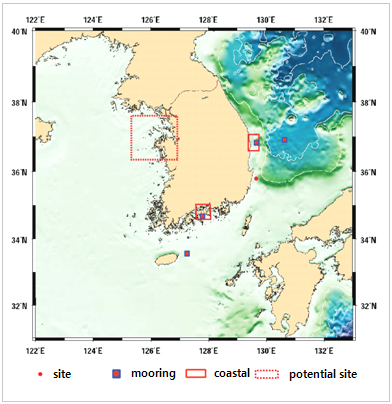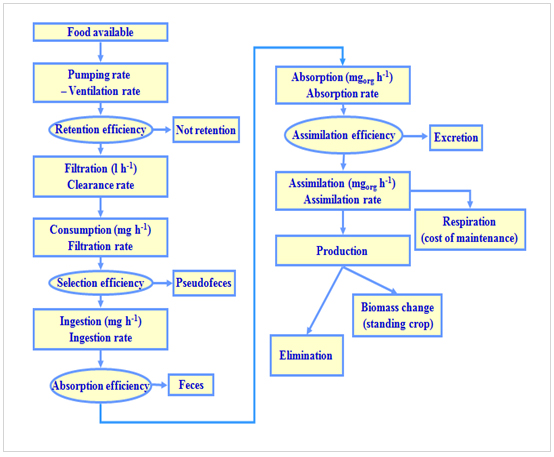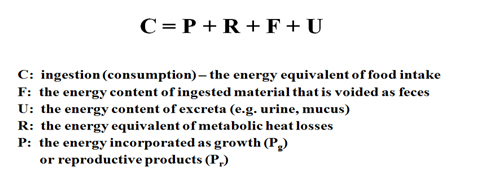On-Going Research
Food availability (environmental forcing)
- Phytoplankton community structures identified by chemotaxonomic (HPLC) analyses and the size fractionation (flow-cytometric) analysis
Physiological energetics (Organism)
- Evaluating physiological processes for adapting to varying environmental conditions
Growth and reproduction (Population)
- Studying the energetics of gametogenic development
Community structure and trophic interactions (Community and Food web dynamics)
- Dealing with more comprehensive ecosystem dynamics
- Highlighting the influence of climate-induced changes in hydrographic structure and circulation (e.g., stratification, thermal regimes and current patterns) on the structure and function of ocean food webs and the productivity of living ocean resources
Current projects
- Long-term marine ecosystem monitoring (LTMER, KIMST 2011-present)
- East Asian Seas Time series-I program (EAST-I, KIMST 2006-present)
- Assessment of marine environmental status and carrying capacity in coastal and aquaculture ecosystems (NFRDI 2010-present)
- Ecosystem-based management of fisheries resources (KMOF 2012-present)
[Long-term Marine Ecosystem Research (LTMER)]
Goal
- Understanding the ecosystem response to environmental change
- biological response and material cycle pattern changes on food web
Research site

Major Contents, Research items
| Major Contents |
Research items |
| Coastal ecosystem structure and function |
- Environmental condition
- Biodiversity (community structure)
- Change of coastal carbon system
- Biomass and production of trophic groups
- Plankton physiology
- Diversity, vertical migration, and trophic role of protozoan
- Metagenome library
- Sedimentary microbial geochemistry
- Food web structure
|
| Offshore ecosystem structure and function |
- Oceanographic observation
- Microbial structuring, nitrifying bacteria, and nitrogen fixation bacteria
- Biomass, species composition production of trophic groups
- Food web dynamics
- Biogeochemical carbon cycles
- Benthic-pelagic coupling
|
| Physiological processes |
- Role of key species under change of environmental conditions
- Physiological processes for adaptation and survival
- Relationship between phenology and environmental factors
- Emerging disease and invasive species
- International collaboration
|
| Ecosystem modeling |
- Ocean circulation model
- Biogeochemical model
- Ecosystem model
|
| Research support |
- QA/QC
- Storage&use of samples
- Workshop, symposium
Policy proposal
|
Main research subjects
- Real-time mooring observation
- Mechanisms of CO2 change in the Ulleung basin of the East/Japan Sea
- Carbon cycles in macroalgal-bed ecosystem
- Physiological changes of seagrass to climate change
- Distribution and diversity of microorganism using next generation sequencing technique
- Grazing and feeding relationship of protozooplankton in marine food web
- Diversity and variability of metazooplankton by gene sequencing
- Food web structure of plankton community
- Metagenomic study on marine ecosystem
- Population dynamics of invasive species
- Monitoring the impact of environmental stresses on benthic invertebrates
- Biogeochemical carbon cycles in pelagic and benthic environments
- Benthic-pelagic coupling
- End-to-end food web study
- Ecosystem modeling
[Assessment of marine environmental status and carrying capacity in coastal and aquaculture ecosystems ]
Goal
The ascidian Styela clava has recently become a common species for suspended aquaculture in Korea. Because of the ecological and commercial importance of this species, it is important to understand its physiological energetics. The purpose of this study was to determine fundamental biological traits for the cultivation of S. clava. Physiological processes (food consumption, feces production, ammonia excretion and respiration) of the ascidian were measured under in situ environmental conditions.
Research site
[Experimental design for ecophysiological measurements]



